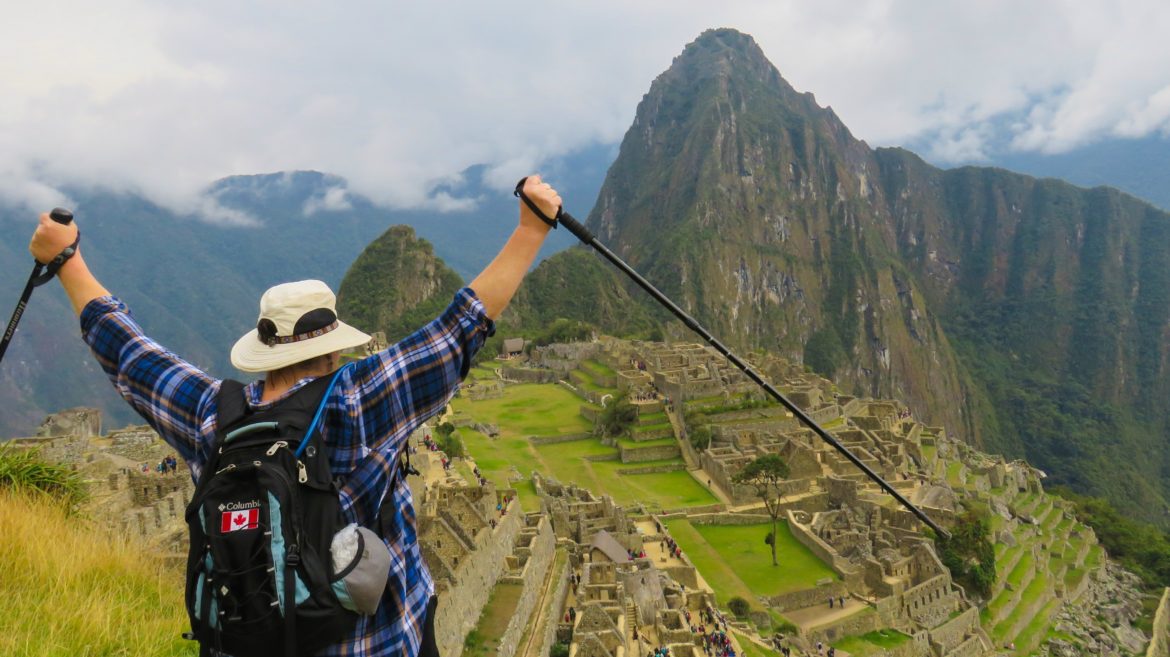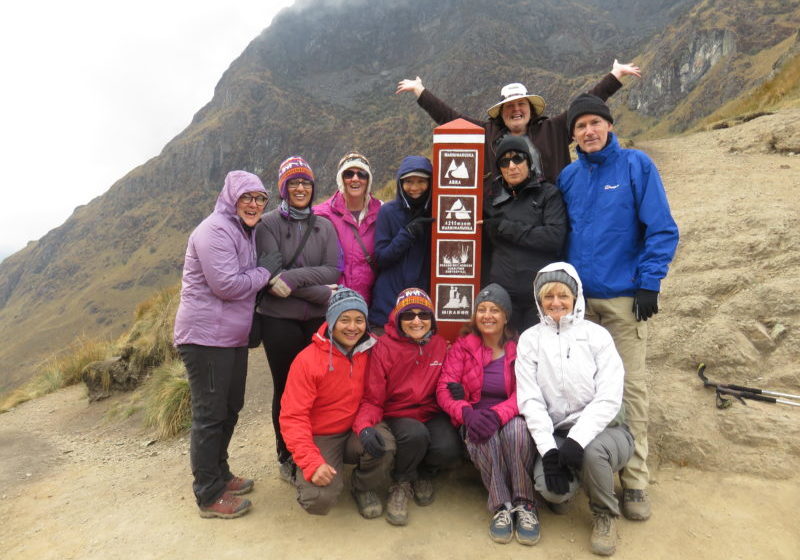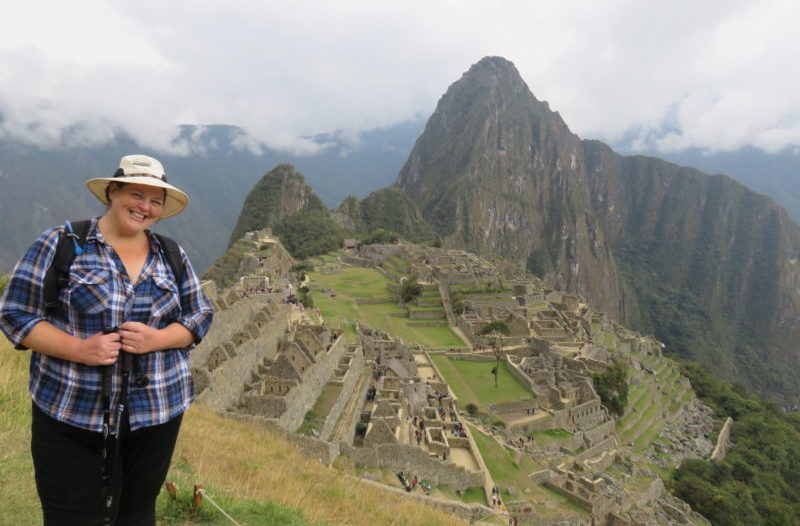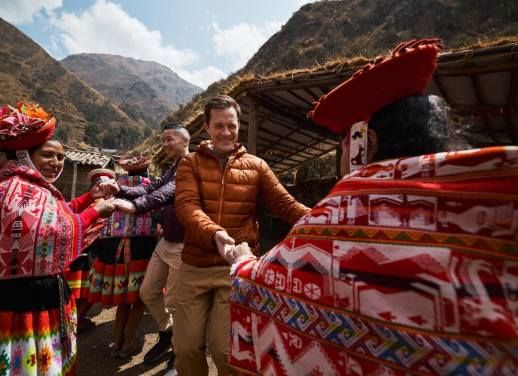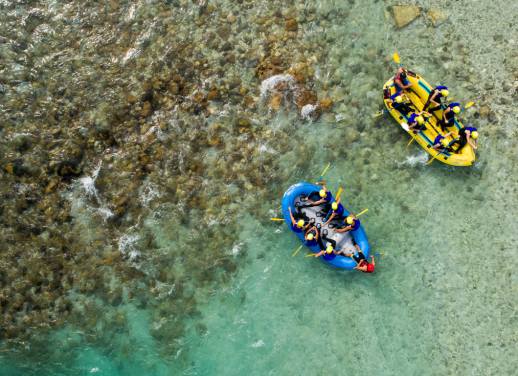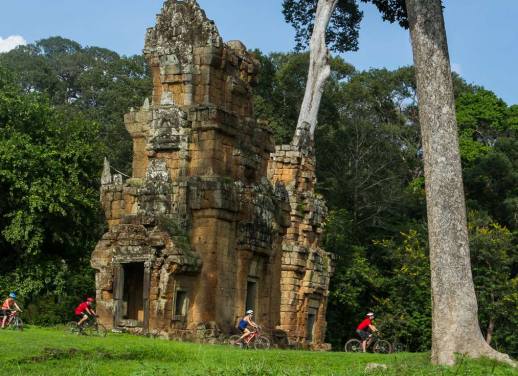This story was shortlisted for the 2017 CBC Nonfiction Prize. Documenting the author’s experience on the Inca Trail with Intrepid Travel, it is republished here with her permission.
—
Everyone died.
The significant ones. My first boyfriend, my brother, my mom, my dad, my Danish host parents, all four grandparents, my best friend. The roots of my tree. My tribe.
Death by suicide, impaired driver, cancer, broken hearts.
Gone.
Gained?
100 lbs.
It was Krista, my best friend, on the phone trying to say the word ‘malignant’ and it coming out ‘malign’, that made my tree fall. The last root, heaved out of the ground, with a futile sigh.
“Krista, this is important. Did the doctor say ‘ma-LIG-nant’ or ‘be-NIGN’?”
“MALIGNANT! That’s it. Is that bad?” A shattering question that sounded like it was coming from an innocent child, not a 40 year old. The weight of how to answer that question sat at the back of my throat.
I heard a tether snap. In my mind’s eye, a brilliant balloon was sky-rocketing into space, with me grasping at ropes, helpless to hold it to the Earth.
After providing all the assurances and hopeful promises that a friend should, I hung up the phone and fell to my knees beside the bed and stared at the power cords on the floor. Tears welled up. “Seriously universe? You’re going to take my best friend too?” I gasped and I wheezed and had that deep, ugly cry that we save for the most primal moments in our lives.
I fell asleep on the floor.
As with every other death, I numbed myself with food. In the six months it took Krista to die, I had gained another 20 pounds to add to the 80 that had crept on since my brother got killed.
For a year, I floated. I felt nothing. When everyone dies, there’s nothing much that can shake you up. The small annoyances in life — standing in lines, gossip, being late, endless snowy days — don’t even register. Day-to-day life can not compete with grief. Grief has its own agenda.
I was staring at the cobweb hanging from the bedroom light; it was noon, I was still in bed.
The web looked like a rain-covered bridge.
To where?
My own voice broke the silence, “I’m going to hike the Inca Trail to Machu Picchu.”
I reached beside the bed, found my laptop, fired it up and booked a trip to Peru.
How easily decisions can be made and then rapidly solidified with confirmation emails. “Ding,” sounded my inbox. “Congratulations on booking with Intrepid!”
“HOLY SHIT!” I said to the cobweb, “I can’t get up a mountain in the freakin’ Andes!”
And so, the road to Machu Picchu started at 385 pounds.
Flash forward eight months later, to kilometer 82; the entrance to the 4-day, 45-km hike to Machu Picchu.
The Quechuan porters that carry the tents and food were sizing me up with unmistakable looks of doubt. I could read their minds, “She’s not actually hiking this trail, is she?”
Looking at them, I had a small moment of panic. “Thomas,” I said to my guide, “I’m not going to die on the Inca Trail, am I?”
He looked at me and drummed his chin, “Maybe.”
I, up until then, had no doubts about getting to Machu Picchu. I had been walking miles back home. Slogging it 17 kilometres around Western Head in the hot, humid Nova Scotian summer. I circled Pine Grove Park over and over again until I could recall from memory every twig on the path. I ran up and down my stairs feeling like my lungs would explode. At the end of the day, however, I was still over 300 pounds and, as I learned, not the typical trekker one sees on the Inca Trail.
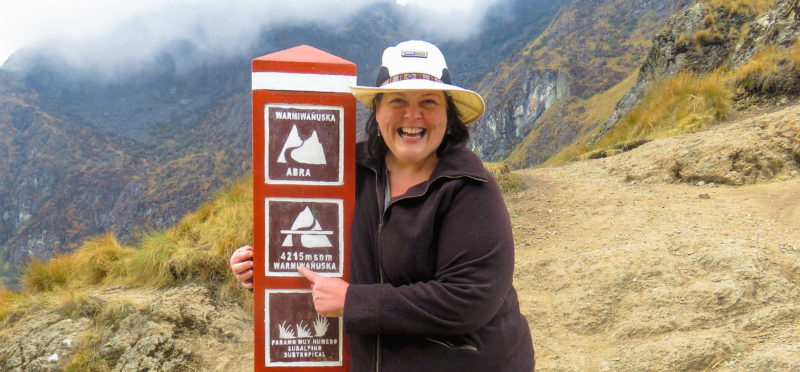 HIKE THE INCA TRAIL LIKE CARLA; CHECK OUT INTREPID’S RANGE OF TRIPS TO MACHU PICCHU
HIKE THE INCA TRAIL LIKE CARLA; CHECK OUT INTREPID’S RANGE OF TRIPS TO MACHU PICCHU
I didn’t die on Day 1. In fact, the porters cracked quizzical smiles at me when I walked into camp that night. I bowed, leaning on my hiking poles, “Oh yes, boys, Big Girl is still on the mountain!” But really, the bets were that I would die Day 2; the day where the daunting and much-feared 4200m Dead Woman’s Pass is to be conquered.
The mantra that played like a sing-song tune in my head was, “Anyone can climb a mountain… one step at a time,” interspersed with nuns singing, “climb every mountain.”
And so I did.
I laughed like a crazy person, as I stood on top of that pass. The thin air and blustery wind stole my breath, but I continued to giggle and turn in a slow 360, agog at the sight of mountain tops. Somehow, I was still alive. There were two more days of hiking ahead, but I had just crested what was expected to be the most challenging part of the hike.
Why was it so easy?
On Day 3, I was talking to a fellow trekker from Australia. “This is so hard!” she said, “I don’t know how you can always be smiling.”
I thought about her words as I ambled along, staring out from the cliff’s edge at the phenomenal mountain peaks that surrounded me.
READ MORE: INTRODUCING NORTHERN PERU, HOME TO THE ‘NEW MACHU PICCHU’
I wasn’t feeling that the hike was hard. I was feeling privileged. I knew that there were people that could never make it up that trail; and I knew that my most important people couldn’t do it because they were six feet under the ground.
Hard?
Trying to understand that the broken, stitched-together body in the coffin is your brother, is hard. Holding your father in your arms as he chokes on his last breath, is hard. Getting a letter in the mail that states, “he killed himself,” is hard. Putting one foot in front of the other, is not hard.
On Day 4, I stood alone at the bottom of a steep incline leading to the Sungate, the entrance to Machu Picchu from the trail. I could see people taking photos and congratulating themselves with pats on the back. Everyone busily pulling out their Bucket Lists and putting a big check mark beside Hike the Inca Trail, sandwiched on the list somewhere between hold a Koala bear and kiss my love at the top of the Eiffel Tower.
The finish.
No.
I wanted to stay on the trail, to go back, to sit in the cloud forest and gasp for air among the llamas. I got emotional with the level of my need for it not to end. I felt so strong and happy.
READ MORE: 7 THING NO-ONE TELLS YOU ABOUT THE INCA TRAIL
The thought of walking through the Sungate and leaving it behind was enough to make tears appear. The feeling I had was so juxtaposed with the jubilation I was seeing from my fellow hikers at the top. I turned inward toward the mountain and through my misty eyes, I saw there a spider web bedazzled with the morning dew, strung between a mass of orchids. It looked like a bridge.
To where?
I slept hard that night and when I woke up it was pouring down rain so much that it was flooding the little courtyard of my hotel. For some reason, I hadn’t remembered seeing rain, for years. I watched it until it became a drizzle and out into the streets I went.
I sat on a bench in the main square of Cuzco. Water was soaking through my clothes, reminding me of the perpetual state of damp I experienced hiking the Trail. It comforted me.
It had been a very long time since I had felt awake. Every foot fall on that mountain was like a grief detox. I left Krista on the mountain, and my brother Craig, mom, dad, all my loves. I left them in the most beautiful place I could find. I had carried them for far too long.
My pants were falling down and my T-shirts were twisting around me. I was getting tangled in my own clothes. The weight that I had accumulated around me like a fortress was flowing out through the bottom of my feet and onto the mountain. I felt like a snake shedding its skin. I was, lighter.
The Trail was like a bridge back to myself.
The truth is, I had forgotten about myself for years.
Everyone died.
But I did not.
The road to Machu Picchu ended at the start.
—
Visit Machu Picchu with Intrepid Travel. Check out our range of trips.
Click here to check out the original piece and click here to check out the Peru and Bolivia trip Carla went on.
—
(All images c/o Carla Powell.)

